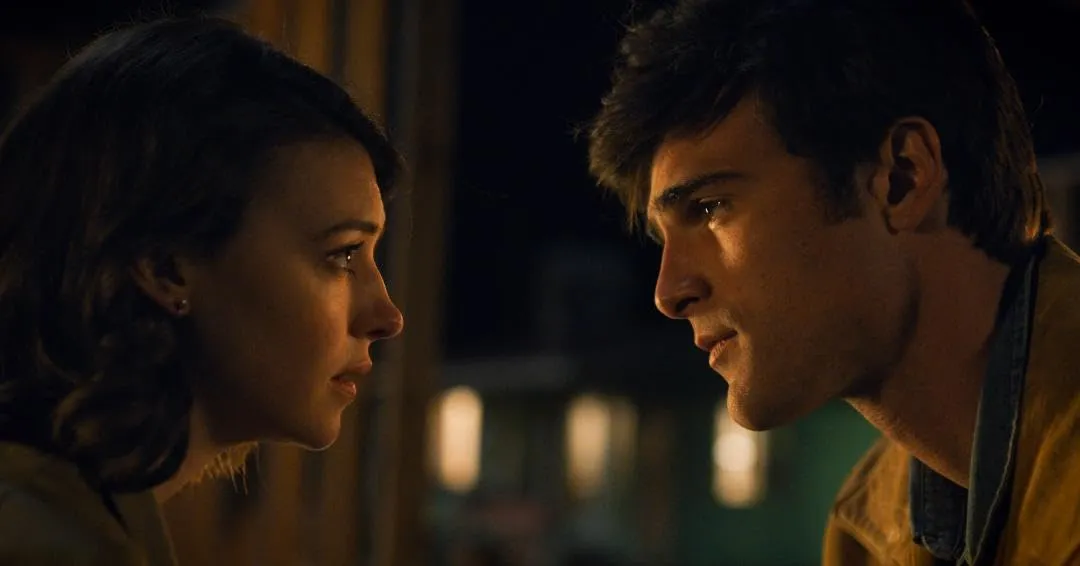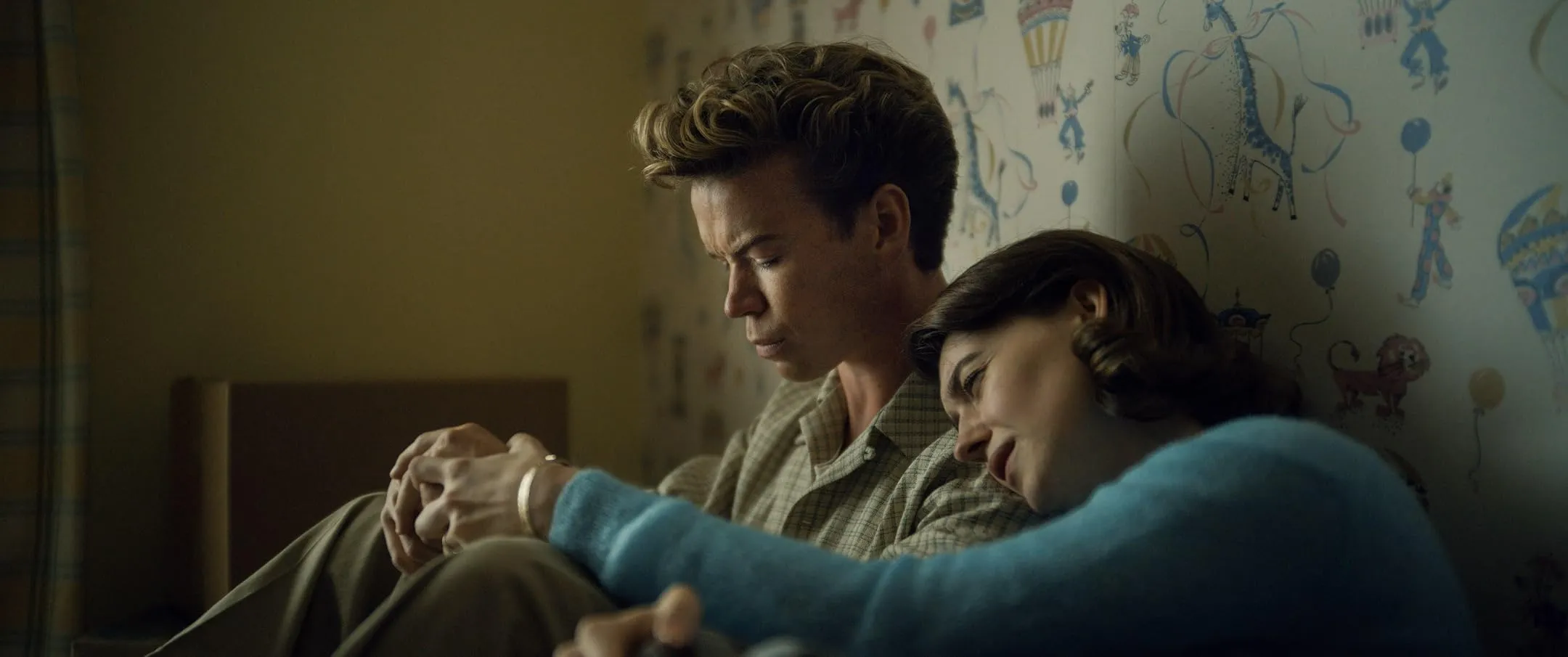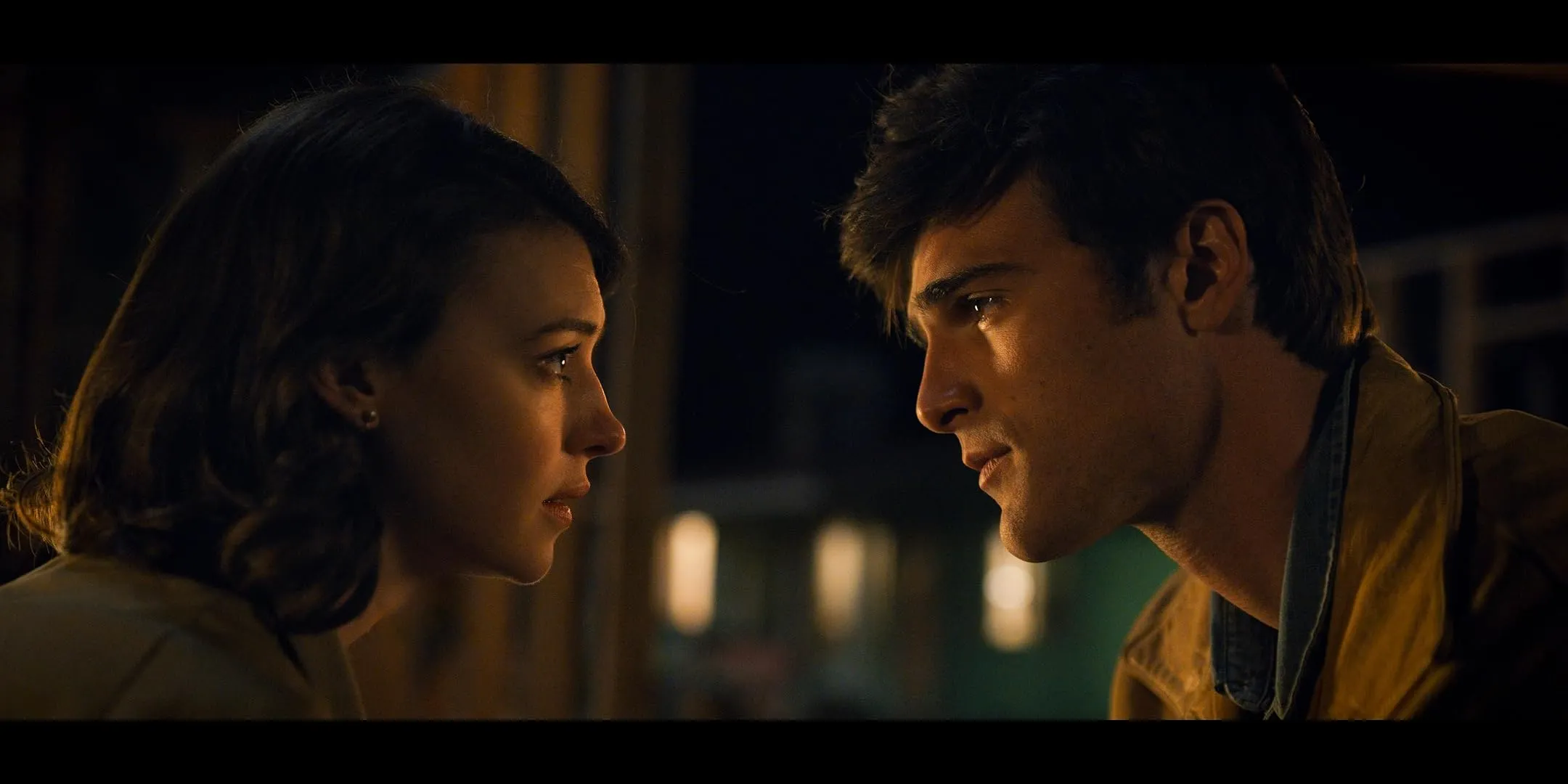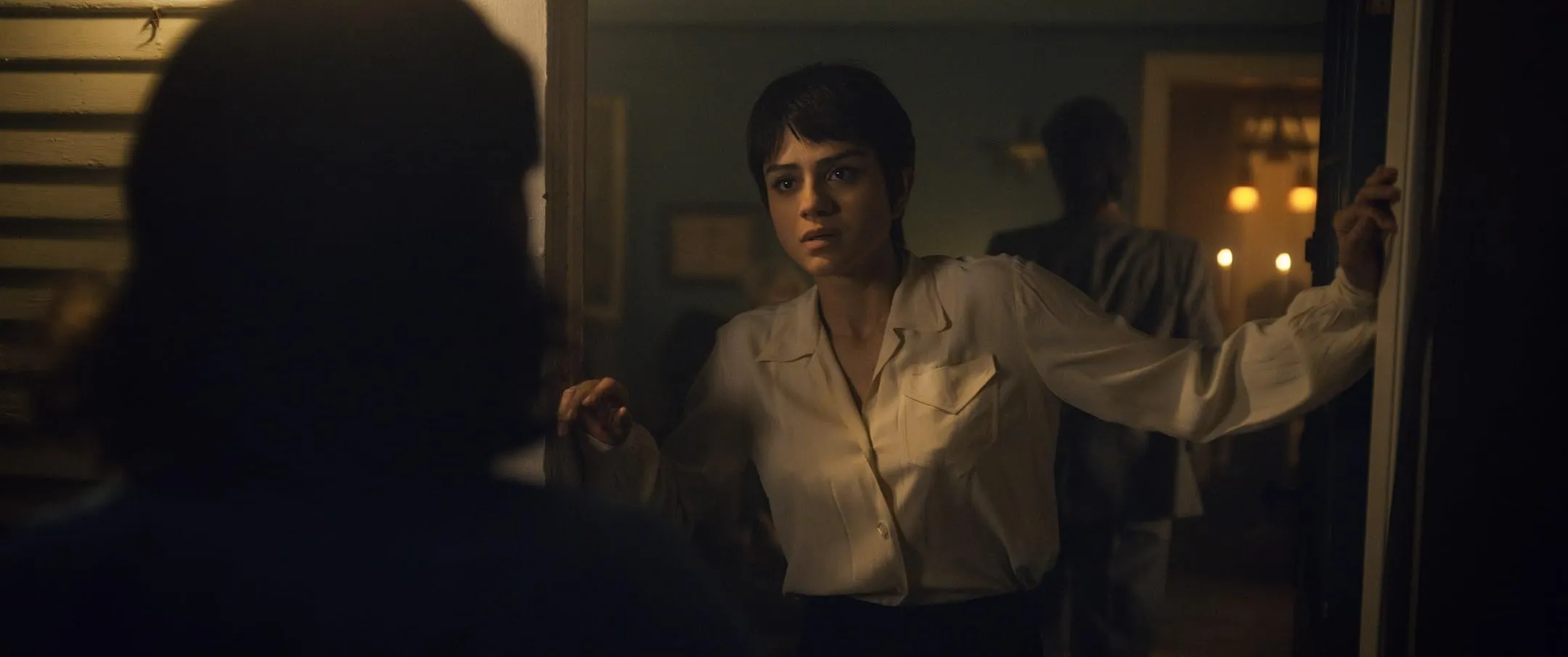Rolling into cinemas is Daniel Minahan’s On Swift Roads, a heartstring-tugging ride back to 1950s America where not everything is as simple as the surface suggests. Helming his first big screen feature since 2001, Minahan adapts Shannon Pufahl’s novel to peer beneath the hoods of seemingly straightforward postwar lives. As the director pilots this tour through repressive eras past, a standout cast hit all the right emotional notes.
We’re introduced to Muriel, dutifully playing the part of small town wife, and Julius, a gambler drifting wherever the wind blows. But cracks soon emerge in their façades. Muriel finds herself drawn elsewhere despite vowing before God and country, while Julius connects with like-minded souls at the fringes. Pursuing hidden truths tests their endurance on a bumpy road with peril lurking around each bend. Though pressured to conform, their spirits long to gallop free across forbidden plains.
Minahan invokes the wide-open vistas that promised prosperity after war yet contained silent screams. When turmoil simmers suppressed, hearts yearn for an escape hatch from stifling boxes. On Swift Roads hits the gas, hurtling toward answers its characters can’t find within a rigid system, threatening to leave them broken down on the hard shoulder of a judgmental era. Strap in and hold on tight—this is one heartland cruise you won’t want to miss.
Curious Crosses in a Conservative Age
The film introduces us to Muriel, who finds herself reluctantly playing the picture-perfect housewife following her marriage to Lee. While he dreams of settling down on a family farm, her heart remains attached elsewhere. Namely with Julius, Lee’s wayward brother, who stirs conflicting feelings within her during his visits.
As soon as he touches down after the war, Julius hits the road once more. His journey leads him to Las Vegas and a job catching cheats at the casinos, where he crosses paths with Henry. A fast friendship soon ignites into passionate romance between the two gambling men, allowing Julius an escape from society’s rigid norms. However, Henry yearns for more than a covert rendezvous.
Out in California, Muriel pursues secrets of her own to avoid facing marital discontent. Working as a waitress brings her into proximity with horse racing tips, leading to successful bets that fund a burgeoning private life. She takes to following interests of another nature, encountering Sandra and blossoming intimacy with her neighbor.
Both Muriel and Julius venture into relationships outside the confinement of marriage. But maintaining double lives comes with risks. Lies grow difficult for Muriel to manage as Lee remains blind to any dysfunction. Elsewhere, Henry’s recklessness ignites trouble forcing their separation.
Over time, the hidden pieces threaten to fall into plain view. As truths emerge and deception takes its toll, our characters head steadily down a difficult road, reaching a junction where the path chosen will alter futures forever. Their fates will collide as lies and loyalty are put to the test in a world unprepared for hearts refusing society’s bounds.
Scenes of Forbidden Passions
Daniel Minahan takes the reins of On Swift Horses for his first leap from the small screen to silver. Long a guiding force behind weighty television dramas, the director wields impressive skills coaxing complete worlds from his cast and crew.
Joining Minahan is eminent cinematographer Luc Montpellier. His camera casts a glow across scenery both vast and intimate, transporting viewers straight to the landscapes and lived-in locations of 1950s middle America. Lush color palettes saturate environments usually seen only in monochrome, bringing an era notorious for repression to vivid life.
Whether sweeping agriculture vistas or suffocating suburban houses, Minahan and Montpellier’s visual mastery enhances overarching themes. Wider establishing shots hint at promised freedoms on the horizon, yet intricate interiors speak volumes regarding stifling societal molds. And within confined spaces, subtle glances and accidental brushes unleash volumes, tension crackling between longing souls.
One sequence silently conveys turmoil through impassioned choreography alone. When Julius pursues Henry at a dingy casino, passion consumes in furtive alleyways. Lithe, masculine forms entangle in enthralling dance, tormented pleasure consuming all. Yet daybreak cruelly separates them once more, cold light exposing lonely figures.
Through daring diversions from expected format, Minahan breathes authenticity into often repressed experiences. On Swift Horses refuses to avert its gaze, honoring forbidden romances with visual poetry that will linger long in memory.
Hearts Bared
Stepping from the small screen into 1950s America, these performers offer revelations. As romantic driftwood Julius, Jacob Elordi embraces vulnerability. Below bravado lies aching care for loved ones lost too soon. Daisy Edgar-Jones stealthily pens Muriel, conformity’s prisoner, hoping to bust free. We feel her muted screams against stifling norms.
Diego Calva ignites as ardent gambler Henry, a livewire scorching up wherever he wanders. With him crosses danger and rapture in vibrant union. Opposite, Elordi finds solace, together fueling a combustion whose aftermath leaves scars. Their intimacy entertains while bringing hidden affection to light.
Charming Will Poulter infuses straitlaced Lee with fallibility. Discerning eyes spot doubts in his pursuit of picket-fenced bliss. Continuing her boundary-pushing as Sandra, Sasha Calle makes waves as passions clash with prejudice’s tide.
Under Minahan’s direction, these performers unveil life’s unseen rhythms. Beyond words spoken dwell volumes unsaid yet clear as daybreak. Their open-heartedness teaches tolerance, letting us see ourselves in others’ shoes. On Swift Horses is a balm for souls, a reminder to embrace fully whomever our hearts decree instead of hiding in shadows fearful of censure. Its stars perform no small service, illuminating paths towards acceptance with nuance and care.
Cloaked Desires Bursting Free
In their stifling world, conformity crushes while nature calls them to spread wings. Minahan’s 1950s is a time when lives remained veiled, identities compressed like molten glass into society’s rigid molds.
For Julius and Muriel, gambling emerges as a symbol—wages standing in for love proscribed, riches replacing fulfillment denied. Their mutual pull comes as no surprise, for beneath surface contrasts lie kindred souls craving to break loose.
Where Julius embraces his queer desires openly, Muriel experiments cautiously. Her marriage maintains appearances while dalliances hint at freedom. But walls enclosing both exact a price and pretending peace leave scars.
Expectations suffocate, throttling natural wants. Socially, love and lust belong to exclusive clubs, their doors firmly closed to some. Minahan spotlights society’s strictures and characters’ resilience in rebelling against stifling controls.
Inner truths long to buzz free as hummingbirds, untethered from judgment. But coming fully untucked brings risks, and so most smiles mask private screams. Under repressive systems, even allies harbor unintended capacity for harm.
On Swift Horses breathes empathy for stifled lives. Its characters underscore love’s many forms and humanity’s right to embrace feelings fully rather than stow them in darkness. Their journey remains relevant, for self-expression will ever demand defense against the intolerant.
Faulty yet Feeling Films
No motion picture emerges without flaws, and On Swift Horses holds its share. Claims say screentime spreads too thin, chasing diverse threads. Perhaps tightening focus would strengthen certain arcs. And yes, the connection between leads isn’t always persuasively rendered.
A fair critique pins slower pacing, failing to consistently grip. While breathing space allows emotion to prosper, slack pacing risks disengagement. And though glorious in spirit, certain intimacies might have ignited screens more.
Yet these qualms felt minor set against achievements. Where many rush emotion, Minahan lets feeling unfold naturally. And while Lee acts no foil, his nature adds nuance, addressing repression’s complex toll. No production satisfies all, and callow passions often blur truth. Still, On Swift Horses triumphs through its heart.
Imperfect it may remain in peers’ eyes, but open minds see past flaws to resonate with its wise, humane soul. Not revision, but appreciation seems due to a work embracing life’s messy joys and sorrows with such care, championing identity’s beauty despite life’s many slings. No utopia this side of paradise, but On Swift Horses brings us nearer with its gracious, understanding spirit.
Tender Truths to Spark Conversation
This throwback romantic drama offers up tender truths to spark conversation. Minahan breathes life into a bygone era, crafting sumptuous tableaus that transport completely. Within he places stellar performances baring the human soul.
Elordi, Edgar-Jones, and Company evolve from celluloid to flesh, capturing complexity with grace. Their ability to speak volumes at a glance reminds us that, despite time’s march, yearnings for fulfillment and struggles against conformity remain intimately familiar. Poulter, Calva, and a gifted ensemble bring multifaceted qualities to the fore.
On Swift Horses thoughtfully explores what it means to remain true to oneself when the world demands a different tune. For anyone wishing to dive into lives both like and unlike their own, it presents lush scenery and beating hearts worth experiencing on the biggest canvas.
As Julius says, “keeping informed” lets one see beyond surface ripples. This impactful drama pushes past superficiality, honoring love and identity in all forms. Its quest resonates today as society continues redefining itself. For those welcoming depth, charm, and nuance sure to spark lively discussion, On Swift Horses delivers in spades.
The Review
On Swift Horses
On Swift Horses conveys stirring lives yearning to break free from stifling conventions, done justice by Minahan's evocative recreation of repressive periods and superb lead performances baring tormented souls. While narrative overreach induces sluggish pacing at times, the film's empathy, graceful exploration of forbidden connection, and thought-provoking relevance to today's ongoing cultural shifts make it a compelling period drama that lingers in memory.
PROS
- Authentic and empathyful depiction of the challenges for LGBTQ+ individuals in the 1950s
- Stunning visual aesthetic that transports viewers to the time period
- Complex, multidimensional characters brought to life by talented ensemble cast
- Thought-provoking exploration of social pressures, self-actualization, and living authentically
CONS
- Narrative occasionally feels overextended trying to incorporate multiple plotlines.
- Pacing lags in some parts of the film.
- Connection between leads Julius and Muriel are not entirely consistently convincing.





















































Discussion about this post